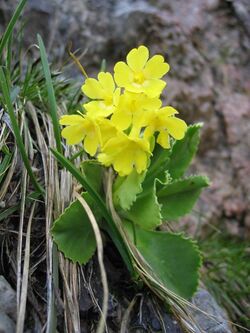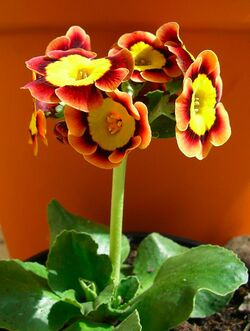Biology:Primula auricula
| Primula auricula | |
|---|---|

| |
| Scientific classification | |
| Kingdom: | Plantae |
| Clade: | Tracheophytes |
| Clade: | Angiosperms |
| Clade: | Eudicots |
| Clade: | Asterids |
| Order: | Ericales |
| Family: | Primulaceae |
| Genus: | Primula |
| Species: | P. auricula
|
| Binomial name | |
| Primula auricula | |
Primula auricula, often known as auricula, mountain cowslip or bear's ear (from the shape of its leaves), is a species of flowering plant in the family Primulaceae, that grows on basic rocks in the mountain ranges of central Europe, including the western Alps, Jura Mountains, the Vosges, the Black Forest and the Tatra Mountains.
Description
It is an evergreen perennial growing to 20 cm (8 in) tall by 25 cm (10 in) wide.[1] The leaves are obovate and stalkless, with a cartilaginous edge, all growing in a basal rosette, and sometimes covered in a mealy white bloom.[1] The yellow flowers grow in clusters on 5–20 cm (2–8 in) long stalks.
The specific epithet auricula means "ear-shaped", and refers to the shape of the leaves.[2]
Taxonomy
A recent study split the species into two, Primula lutea and P. auricula, with the former being found further south and east (Apennines, Carpathians, Balkans, and the southern and eastern Alps). Prior to this study, P. lutea had been considered synonymous with P. auricula. Other synonyms of P. auricula include P. balbisii and P. ciliata.
Cultivation
This plant has gained the Royal Horticultural Society's Award of Garden Merit.[3][4] In the UK two National Collections of auriculas are held by Hillview Hardy Plants nursery, on a 1 acre (0.4 ha) plot in Worfield, Shropshire.[5][6]
Auriculas
The term auricula is also used collectively for plants which have been developed from a hybrid between P. auricula and P. hirsuta. Thousands of cultivars are available in a wide range of colours, and several societies are devoted to their cultivation and display.[7][8]
Primula auricula is depicted on the obverse side of Austrian € 0.05 euro coins.
References
- ↑ 1.0 1.1 RHS A-Z encyclopedia of garden plants. United Kingdom: Dorling Kindersley. 2008. pp. 1136. ISBN 978-1405332965.
- ↑ Harrison, Lorraine (2012). RHS Latin for gardeners. United Kingdom: Mitchell Beazley. pp. 224. ISBN 9781845337315.
- ↑ "Primula auricula". https://www.rhs.org.uk/plants/13705/i-primula-auricula-i-l-(au)/details.
- ↑ "AGM Plants - Ornamental". Royal Horticultural Society. July 2017. pp. 96–97. https://www.rhs.org.uk/plants/pdfs/agm-lists/agm-ornamentals.pdf. "pages update April 2023 doc."
- ↑ Smith, Sue (5 May 2022). "Bridgnorth plant nursery to feature on Gardener's World". https://www.shropshirestar.com/news/local-hubs/bridgnorth/2022/05/05/plant-nursery-to-feature-on-gardeners-world/.
- ↑ "Primula auricula talk". https://www.plantheritage.org.uk/events/national/primula-auricula-theatre-time/.
- ↑ "National Auricula & Primula Society - Midland & West Section". http://www.auriculaandprimula.org.uk/.
- ↑ "National Auricula & Primula Society - Northern Section". http://www.auriculas.org.uk/.
- Zhang, L-B., & J. W. Kadereit (2004): Classification of Primula sect. Auricula (Primulaceae) based on two molecular data sets (ITS, AFLPs), morphology and geographical distribution. Botanical Journal of the Linnean Society 146: 1–26.
- Zhang, L-B. & J. W. Kadereit (2005): Typification and synonymization in Primula sect. Auricula (Primulaceae). Taxon 54 (3): 775–788.
Further reading
External links
Wikidata ☰ Q164186 entry
 |


